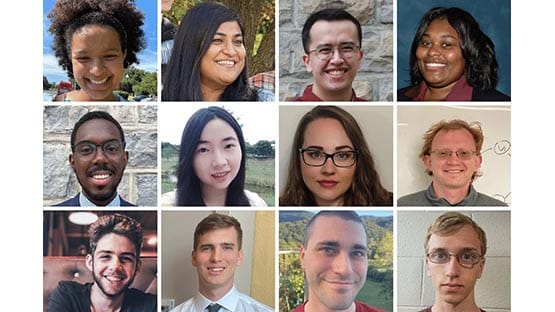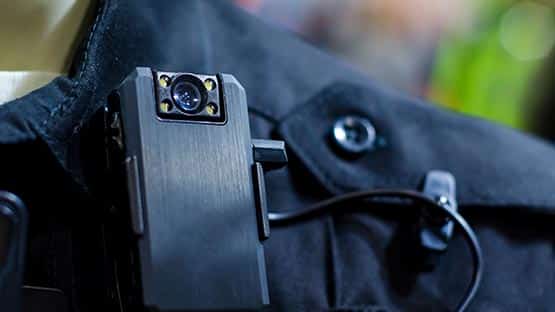
CCI student researchers receive training on cutting-edge projects with vertically integrated teams, developing technical skills as well as their ability to communicate. As they learn, the student researchers also motivate and power CCI’s overarching mission, said Gretchen Matthews, Virginia Tech math professor and director of CCI in Southwest Virginia.
“Their hard work and insight advance cybersecurity research, their talent and intuition contribute to innovation, and their developing careers meet the growing demand for cybersecurity expertise in the commonwealth and beyond,” said Matthews. “We are very proud of what they are accomplishing and proud to support them.”
In fiscal year 2022, the Commonwealth Cyber Initiative in Southwest Virginia supported 132 students engaged in cybersecurity research projects and 59 undergraduates in experiential learning opportunities at institutions throughout the region. The Southwest Virginia node will be spotlighting CCI student researchers on social media throughout October for Cybersecurity Awareness Month.
When asked what he loves about cybersecurity research, Emerson Dove said: “Thinking about a problem in a way that nobody has ever thought of before.” An electrical and computer engineering major, Dove works on the CCI-supported battledrone project, where students explore autonomous flying, computer vision, neural networks and robotics in a single project.
Ya Xiao investigated the privacy risks of digital contact tracing technology such as the COVIDWISE app during her time as a CCI student researcher and computer science graduate student.
“I want to continue to explore this area and contribute to it,” said Xiao, who successfully defended her Ph.D. dissertation in July. She accepted a job with the business integrity team at TikTok, where she uses machine-learning approaches to detect policy-violating advertisers.
Spotlight on student researchers
Bruce Barbour
Aerospace and ocean engineering, College of Engineering, Virginia Tech
Research advisor(s): Samantha Parry Kenyon, Jonathan Black
Research focus: Hardware-in-the-loop network test bed for small satellites
“NeTSat is a hardware-in-the-loop testbed using off-the-shelf components configured to model, simulate, and evaluate global satellite networks (e.g., OneWeb and Starlink). I’ve been working rigorously with our project teams from Virginia Tech and the University of Surrey to help bolster the early development process for ensuring our short- and long-term goals are maintained and reached. Owing to my aerospace background, it has been personally challenging for me to catch up with the electrical engineering concepts throughout, but the incredible mentorships from both institutions have greatly benefited my understanding of spacecraft communication.”
Emerson Dove
Electrical and computer engineering, College of Engineering, Virginia Tech
Research advisor(s): Kevin Schroeder
Research focus: BattleDrones: A CCI autonomous drone racing competition
BattleDrones is an experiential learning program designed to engage students from institutions across Virginia in autonomous systems and the data and algorithms that drive them. Aligned with the Commonwealth Cyber Initiative’s aims of developing and enhancing experiential learning projects at the intersection of cybersecurity, autonomous systems, and data, this project will build multidisciplinary teams across the Southwest Virginia node and the commonwealth to compete in “battle” drone racing competitions.
Naru Jai
Electrical and computer engineering, College of Engineering, Virginia Tech
Research advisor: Tom Hou
Research focus: Supporting multi-scale latency services and security enhancement for 5G/Next-G
Citizen Broadband Radio Service (CBRS) band is a frequency spectrum starting from 3550 MHz to 3700 MHz. The usage of this bandwidth is currently governed by Federal Communications Commission (FCC) through a three-tiered architecture, which serves different levels of users. The operation and management of the band is centrally performed by a cloud-based service called Spectrum Access System (SAS). A key challenge to harness the full potential of the CBRS band is channel allocation for the different levels of users. The goal of SAS is to maximize spectrum efficiency while ensuring interference resilience. It turns out that this problem involves complex mathematical formulation with a large search space for an optimal solution. Jai and her research team developed an approach to this problem by considering the U.S. Navy’s shipborne radars as incumbent users along the coast of Virginia. Through simulation experiments with real-world CBRS map and Dynamic Protection Areas along the east coast of Virginia, Jai’s team demonstrated that an optimal solution can be found within the timing requirement set forth by FCC.
Kellie Johnson
Agricultural, leadership, and community education, College of Agriculture, Virginia Tech
Research advisor: Tiffany Drape
Research focus: Interdisciplinary approach to experiential learning in agriculture through workforce development
Cyber biosecurity and workforce development in agriculture and the life sciences (ALS) is an area for improvement in the curriculum at land grant institutions. Students who pursue majors related to ALS often don’t receive training in cyber-related concepts or the “hidden curriculum” of seeking internships and jobs. This study examines how to use coursework to show students the hidden curriculum and prepare them for internships to provide experiential learning opportunities. This study is intended to enhance the growth of the cyber biosecurity field and provide students with applicable skills that are transferable between the classroom and workforce. Results also can serve as a valuable educational tool that organizations and institutions can use as a model to develop their own educational experiential learning experiences.
William Mahaney
Mathematics, College of Science, Virginia Tech
Research advisor: Travis Morrison
Research focus: Evaluation of lattice-based candidates in the NIST Post-Cryptography Standardization Process in terms of security and performance in hardware
Post-quantum cryptosystems are public-key cryptographic schemes whose security relies on computational problems that are hard for quantum computers. One major family of post-quantum cryptosystems are the lattice-based cryptosystems, whose hardness comes from computational problems involving lattices: discrete analogues of real vector spaces. A hard problem of major interest in cryptography is the Closest Vector Problem (CVP), where one is given a lattice and challenge vector in Rn and asked to find the lattice point closest to the challenge vector. To instantiate the lattice-based signature scheme FALCON, there is a need to quickly produce short lattice bases so that a signer can solve the CVP efficiently to produce cryptographic signatures. This work in progress aims to accelerate the key generation process of FALCON in order to better facilitate ephemeral uses of the signature scheme.
Mary Nerayo, Joseph Harrison, Jaden Leonard
Virginia Tech National Security Institute
Research advisor: Alan Michaels
Research focus: Use and Abuse of Personal Information – tracking the propagation of 100K [fake] identities on the internet
A team of student researchers is investigating who sells our online information and to whom. The students signed up 300 fake identities to 188 reputable organizations in a one-time transaction and then traced mentions of those identities across the web as well as emails, voicemails, and text messages received to draw a web of information sharing. Ongoing efforts will expand this pilot study to over 100,000 fake identities across a much broader section of the internet.
Kolby Quigg
Computer and Information Sciences, Virginia Military Institute
Research advisor: Sherif Abdelhamid
Research focus: Web-based software-as-a-service modeling environment to study and analyze wireless 5G networks as complex systems
This project proposes a web-based modeling and analytical environment prototype for predicting the spread of malicious behaviors and computer viruses on 5G and other types of networks. Quigg and his team are using a new approach to view networks as a complex system of components that interact together. This work will be beneficial to cybersecurity analysts, researchers, business IT professionals, and students.
Nitasha Sahani
Electrical and Computer Engineering, College of Engineering, Virginia Tech
Research advisor: Chen-Ching Liu
Research focus: The 5G power grid and the impact of 5G on the existing and future power grid
Potential disturbances caused by extreme weather events or cyberattacks can lead to power supply disruptions to the main grid. Microgrids have the capability to sustain critical services without relying on the utility grids. Reliable communication is key for monitoring geographically distributed networks. Wireless communication has the potential to provide cheaper, wider coverage connectivity for distributed smart grid components. The 5G power grid study evaluates the efficiency of 5G wireless communication in a distributed grid setup for time-sensitive applications. It focuses on the design requirements and integration capability of 5G within an existing distribution system to analyze the impact of 5G on a smart grid.
Stephen Timmel
Mathematics, College of Science, Virginia Tech
Research advisor: Gretchen Matthews
Research focus: Polar coding and its use in 5G
When designing error-correcting codes, it is standard to assume that errors in each symbol are independent. The resulting models ignore many real-world instances of channel memory such as burst noise and intersymbol interference, which must often be accounted for separately in implementations. This oversimplification is especially problematic for the family of polar codes, which provide unprecedented asymptotic bounds using a very explicit model of the communication channel. Timmel and his team are extending existing results to explore when polar codes can be applied directly to channels with memory, potentially leading to improved performance in 5G applications.
Ya Xiao
Computer Science, College of Engineering, Virginia Tech
Research advisor: Daphne Yao
Research focus: The intersection of security and machine learning
Xiao’s research focuses on inventing machine learning approaches to solve security problems in the real world, including helping developers write secure code easier, screening security-critical codebases, and exposing insider threat behaviors. In one CCI-supported project, Xiao and her team examined and analyzed the security, privacy, and reliability of COVID-contact tracing technology with actual and typical scenarios with a typical adversary in mind.
For more information on the Commonwealth Cyber Initiative, visit https://cyberinitiative.org/










